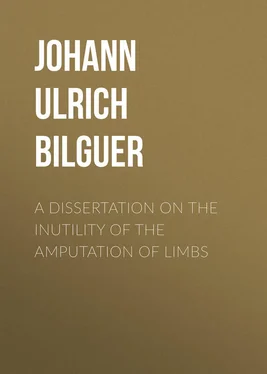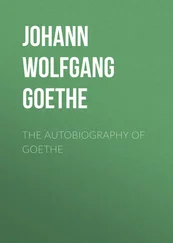Johann Bilguer - A dissertation on the inutility of the amputation of limbs
Здесь есть возможность читать онлайн «Johann Bilguer - A dissertation on the inutility of the amputation of limbs» — ознакомительный отрывок электронной книги совершенно бесплатно, а после прочтения отрывка купить полную версию. В некоторых случаях можно слушать аудио, скачать через торрент в формате fb2 и присутствует краткое содержание. Жанр: foreign_language, foreign_antique, foreign_prose, на английском языке. Описание произведения, (предисловие) а так же отзывы посетителей доступны на портале библиотеки ЛибКат.
- Название:A dissertation on the inutility of the amputation of limbs
- Автор:
- Жанр:
- Год:неизвестен
- ISBN:нет данных
- Рейтинг книги:4 / 5. Голосов: 1
-
Избранное:Добавить в избранное
- Отзывы:
-
Ваша оценка:
- 80
- 1
- 2
- 3
- 4
- 5
A dissertation on the inutility of the amputation of limbs: краткое содержание, описание и аннотация
Предлагаем к чтению аннотацию, описание, краткое содержание или предисловие (зависит от того, что написал сам автор книги «A dissertation on the inutility of the amputation of limbs»). Если вы не нашли необходимую информацию о книге — напишите в комментариях, мы постараемся отыскать её.
A dissertation on the inutility of the amputation of limbs — читать онлайн ознакомительный отрывок
Ниже представлен текст книги, разбитый по страницам. Система сохранения места последней прочитанной страницы, позволяет с удобством читать онлайн бесплатно книгу «A dissertation on the inutility of the amputation of limbs», без необходимости каждый раз заново искать на чём Вы остановились. Поставьте закладку, и сможете в любой момент перейти на страницу, на которой закончили чтение.
Интервал:
Закладка:
SECT. XV
The bark may be given by itself, in powder, or made into an electuary with rob of elder, or with the syrup of quinces, cinnamon, orange-peel, or any other cordial syrup; if it purges when taken in substance, it must be administered in the infusion or extract. If the fever be strong, the heat considerable, and the patient thirsty, the bark will be of no service 12; but recourse must be had to medicines which may abate the fever and allay the heat, such as are commonly called temperants.
If the bark be judged necessary, it may be given in doses of half a dram or two scruples, at first every hour, afterwards every two hours, and at length, once every three or four hours: To each dose may be added a few drops of spirit of sea salt, or of dulcified spirit of vitriol, or a few grains of alum or catechu. If the patient be very weak, a small glass of some acid wine may be ordered with the medicine, such as Rhenish, Neckar or Moselle wine, &c. When it is thought proper to promote perspiration, an infusion of chamomile may be drank, as is recommended by Dr. Pringle. Let the strength be supported by the plain regimen, directed by that physician in the same treatise.
Let the drink be water and vinegar, weak veal and chicken broth, gruels of barley or oatmeal, acidulated with vinegar or juice of lemons, &c. I have not room, in this place, to enter into a more particular discussion.
SECT. XVI
I now return to the external treatment. When the dressings described, § X SECT. X When the incisions are made, if the neighbouring parts appear somewhat tainted, we must, by gentle compression, squeeze out the corrupted humour which may harbour there, and wipe it off with a bit of soft linnen rag. Afterwards, whether it may have been necessary to extract, either with the fingers, a scalpel, or with the instrument called a myrtle leaf 7 7 See Dionis's surgery, page 18. 4th edition. , any bony splinters too much detached from the substance of the bone itself to hope for a re-union, a circumstance which often requires a considerable dilatation of the fleshy parts; or whether the bones appear carious, or spoiled in any other shape; or, lastly, whether we may have been obliged to make deep incisions, even to the bone: In all these cases, we must at first employ such external applications as are proper for the bones, and for the soft parts that have a tendency to mortification, although they may have discharged a sufficient quantity of blood during these operations. The bone, whether the periosteum be sound or destroyed, must be dressed with the following medicine: Of frankincense, mastick, sarcocolla and myrrh finely pounded, true balsam of Peru, and genuine essential oil of cloves, of each equal parts; of balsam of Fioraventi, as much as may, in mixing all the ingredients over a very gentle fire, form a thin liniment ; which must be warmed when used, and which must be poured plentifully into the wounds I am speaking of, so that the bone may be well moistened therewith. This medicine is of service in all cases where the bone is affected. When the bone is covered with it, some dry lint may be laid over it, and the soft parts dressed by sprinkling upon this lint a powder composed of an ounce of myrrh finely pounded, half an ounce of sal ammoniac, camphor and nitre, each a dram . After the first layer of lint is thus covered, fresh lint must be applied, and again sprinkled with the powder, till in this manner the cavity of the wound is quite filled up with alternate layers of lint, and this vulnerary powder.
, XI SECT. XI If the bone is not affected, or the periosteum laid bare, the balsam or thin liniment may be omitted. And the dressings may only consist of the layers of dry lint and vulnerary powder applied alternately.
, XII SECT. XII Besides the dressings I have mentioned ( § X. SECT. X When the incisions are made, if the neighbouring parts appear somewhat tainted, we must, by gentle compression, squeeze out the corrupted humour which may harbour there, and wipe it off with a bit of soft linnen rag. Afterwards, whether it may have been necessary to extract, either with the fingers, a scalpel, or with the instrument called a myrtle leaf 7 7 See Dionis's surgery, page 18. 4th edition. , any bony splinters too much detached from the substance of the bone itself to hope for a re-union, a circumstance which often requires a considerable dilatation of the fleshy parts; or whether the bones appear carious, or spoiled in any other shape; or, lastly, whether we may have been obliged to make deep incisions, even to the bone: In all these cases, we must at first employ such external applications as are proper for the bones, and for the soft parts that have a tendency to mortification, although they may have discharged a sufficient quantity of blood during these operations. The bone, whether the periosteum be sound or destroyed, must be dressed with the following medicine: Of frankincense, mastick, sarcocolla and myrrh finely pounded, true balsam of Peru, and genuine essential oil of cloves, of each equal parts; of balsam of Fioraventi, as much as may, in mixing all the ingredients over a very gentle fire, form a thin liniment ; which must be warmed when used, and which must be poured plentifully into the wounds I am speaking of, so that the bone may be well moistened therewith. This medicine is of service in all cases where the bone is affected. When the bone is covered with it, some dry lint may be laid over it, and the soft parts dressed by sprinkling upon this lint a powder composed of an ounce of myrrh finely pounded, half an ounce of sal ammoniac, camphor and nitre, each a dram . After the first layer of lint is thus covered, fresh lint must be applied, and again sprinkled with the powder, till in this manner the cavity of the wound is quite filled up with alternate layers of lint, and this vulnerary powder. and § XI. SECT. XI If the bone is not affected, or the periosteum laid bare, the balsam or thin liniment may be omitted. And the dressings may only consist of the layers of dry lint and vulnerary powder applied alternately. ) for these kinds of wounds, we must likewise make slight scarifications upon the neighbouring parts, and sprinkle them with the powder; after this treatment, embrocate all the sores with oil of turpentine, and then lightly bandage up the whole with plain linnen cloth, which must be kept moistened, night and day, with warm fomentations.
. have begun to procure a discharge of matter, the use of the vulnerary powder and oil of turpentine must be laid aside; but we must continue to assist and promote the suppuration for several days, sometimes even to the eighth; by dressing with the digestive, I shall hereafter mention, by keeping the parts constantly covered with emollient fomentations, and by avoiding to cleanse the wound too much, either by too strong compression, or by wiping it with too much exactness each time of dressing. We ought to be very much on our guard with respect to these two last points, till there be a sufficient suppuration; afterwards a somewhat stronger compression may be allowed, and the sore may be wiped with more exactness, but still, nevertheless, but very gently. For suppuration is the work of nature, an effort of the sound parts, by which they throw off whatever is vitiated and noxious; and it is the business of the surgeon to assist this salutary operation, by removing, with his instruments, such parts as are intirely corrupted; but this ought to be done, at least as much as possible, without causing any discharge of blood 13
Конец ознакомительного фрагмента.
Текст предоставлен ООО «ЛитРес».
Прочитайте эту книгу целиком, купив полную легальную версию на ЛитРес.
Читать дальшеИнтервал:
Закладка:
Похожие книги на «A dissertation on the inutility of the amputation of limbs»
Представляем Вашему вниманию похожие книги на «A dissertation on the inutility of the amputation of limbs» списком для выбора. Мы отобрали схожую по названию и смыслу литературу в надежде предоставить читателям больше вариантов отыскать новые, интересные, ещё непрочитанные произведения.
Обсуждение, отзывы о книге «A dissertation on the inutility of the amputation of limbs» и просто собственные мнения читателей. Оставьте ваши комментарии, напишите, что Вы думаете о произведении, его смысле или главных героях. Укажите что конкретно понравилось, а что нет, и почему Вы так считаете.












